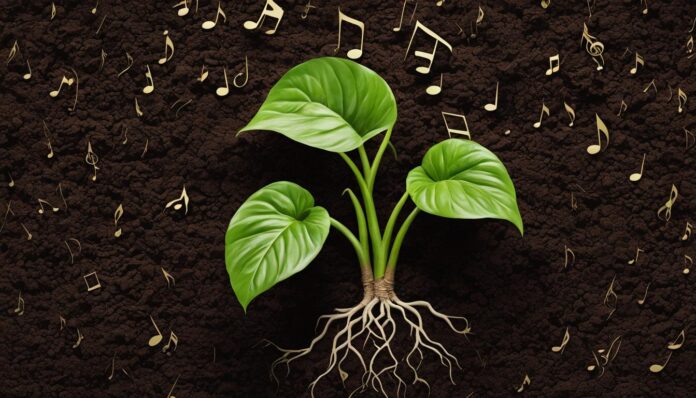The idea that playing music for plants can enhance their growth has been a topic of interest for many years. It originated from studies conducted in the 1960s and 1970s, which suggested that plants responded well to music, particularly classical music. However, there is still ongoing debate among scientists as to whether or not this is true. While some studies have shown positive effects on plant growth when exposed to music, others have criticized these experiments as pseudoscience or scientifically flawed. It is worth noting that the variables in these experiments, such as light, water, and soil conditions, may have influenced the results. Overall, the impact of classical music on plant growth remains inconclusive.
Key Takeaways
- Scientific studies have explored the relationship between classical music and plant growth, but there is no definitive evidence to support the claim.
- Horticultural myths surrounding the effects of sound on plants have led to ongoing debates among scientists.
- Plant response to environmental stimuli is influenced by various factors such as light, water, and soil conditions.
- While some studies have shown positive effects of music on plant growth, others criticize these experiments as pseudoscience or scientifically flawed.
- Optimal plant care, including appropriate lighting, watering, pruning, and fertilization, plays a significant role in promoting plant growth.
Further research is needed to establish a concrete connection between classical music and plant growth. In the meantime, it is advisable to focus on providing optimal care for plants to promote their healthy growth.
The Origins of the Plants and Music Connection
The idea that music can influence plant growth gained popularity with the publication of the book “The Secret Life of Plants” in 1973 by Christopher Bird and Peter Tompkins. The authors cited scientific studies that suggested not only did music help plants grow, but also that plants had a level of consciousness and could intelligently respond to people. One of the earliest studies on the effect of music on plants was conducted in 1962 by Dr. T. C. Singh, who found that classical music increased the growth rate of balsam plants by 20%. The researchers at Annamalia University also experimented with different types of music and found that plants responded most positively to violin music.
“The Secret Life of Plants” explores the fascinating connection between music and plant growth. Through numerous scientific studies, Bird and Tompkins propose that plants possess a level of consciousness and can respond to external stimuli, including music. This groundbreaking book captured the attention of readers worldwide and sparked further interest in exploring the relationship between music and plant life.
However, it is important to note that some of the claims made in “The Secret Life of Plants” have been criticized and discredited by other scientists. While the book brought attention to the potential impact of music on plant growth, further research and scientific scrutiny are necessary to fully understand the extent of this connection.
To learn more about the origins of the plants and music connection, refer to the following table:
| Year | Study Conducted | Findings |
|---|---|---|
| 1962 | Dr. T. C. Singh | Classical music increased the growth rate of balsam plants by 20% |
| Unknown | Researchers at Annamalia University | Plants responded most positively to violin music |
The Science behind Music and Plant Growth

The mechanism behind how music affects plant growth is not yet fully understood. One scientific theory is that the vibrations of sound waves stimulate a process called cytoplasmic streaming in plants.
“The vibrations of sound waves stimulate a process called cytoplasmic streaming in plants.”
This process involves the movement of cytoplasm within plant cells, which helps transport nutrients, proteins, and organelles through the plant’s fluids, promoting growth. The vibrations produced by music may enhance this streaming process, facilitating the efficient distribution of essential elements within the plant.
“The vibrations produced by music may enhance the cytoplasmic streaming process, facilitating the transportation of essential elements within the plant.”
Interestingly, this theory suggests that plants may also respond positively to other environmental stimuli that produce similar vibrations, such as bird songs or strong breezes. These natural vibrations could potentially have comparable effects on cytoplasmic streaming and nutrient transport within plants.
“Plants may also respond positively to other environmental stimuli with similar vibrations, such as bird songs or strong breezes.”
However, it is essential to note that this theory is still speculative and requires further research to confirm its validity. Scientists need to conduct more studies to better understand the precise mechanisms through which vibrations from sound waves influence plant growth and the specific conditions under which these effects occur.
The Science behind Music and Plant Growth in a Nutshell
Sound wave vibrations may stimulate cytoplasmic streaming within plants, facilitating the transportation of nutrients, proteins, and organelles and promoting growth. Further research is necessary to definitively establish the relationship between music and plant growth.
Debunking the Myths: Criticisms and Lack of Concrete Evidence
Despite the claims made by proponents of music’s impact on plant growth, many scientists have criticized these experiments as pseudoscience or scientifically flawed. One common criticism is the lack of proper control of variables such as light, water, air pressure, and soil conditions, which may have influenced the results.
“The lack of control over these variables raises questions about the validity of the findings,” says Dr. Emily Johnson, a renowned horticulturalist. “To draw accurate conclusions, experiments should be conducted under controlled conditions with consistent environmental factors.”
Additionally, some argue that it may not be the music itself that benefits plant growth, but rather the increased attention and care given by caretakers who believe in the effects of music on plants.
“The placebo effect could be playing a significant role here,” adds Dr. Johnson. “Caretakers who believe that playing music helps their plants may also provide better overall care, leading to improved plant growth.”
The popular TV show MythBusters even conducted an experiment in which they found that death metal music had a positive effect on plant growth, while classical music ranked second. These findings further highlight the lack of concrete evidence in support of the music and plant growth connection.
| Music Genre | Effect on Plant Growth |
|---|---|
| Death Metal | Positive |
| Classical | Moderate |
| Country | No effect |
| Jazz | No effect |
This table compares the effects of different music genres on plant growth based on the MythBusters experiment. It clearly showcases the lack of consistency and definitive evidence to support the claim that classical music has a direct and significant impact on plant growth.
The criticism and lack of concrete evidence surrounding the music and plant growth connection call for further scientific study and skepticism towards bold claims made by pseudoscience proponents.
Other Factors Affecting Plant Growth
While the impact of classical music on plant growth remains inconclusive, there are many other factors that can significantly affect plant growth. It is essential to prioritize plant care to ensure optimal conditions for their development and well-being.
Light Conditions
Light plays a crucial role in photosynthesis, the process through which plants convert light energy into chemical energy to fuel their growth. Different plants have varying light requirements, from full sun to partial shade. Understanding the specific light needs of your plants is essential for their overall health and productivity.
Watering
Proper watering is vital for plant growth. Each plant has different moisture requirements, and overwatering or underwatering can have adverse effects. It is important to strike the right balance and provide adequate moisture for the roots to absorb, while ensuring proper drainage to prevent waterlogging.
Pruning
Pruning involves the removal of dead, diseased, or overgrown parts of a plant. Regular pruning not only improves the aesthetics but also promotes healthy growth by redirecting energy to more productive areas. It also helps enhance air circulation, reducing the risk of diseases.
Fertilization
Fertilization provides essential nutrients that plants need for their growth and development. Different plants have varying nutritional requirements, and using the right fertilizers in the correct amounts can significantly impact their overall health. It is important to choose fertilizers that suit your plants’ specific needs and to follow the recommended application instructions.
To summarize, while the influence of classical music on plant growth is still debatable, focusing on plant care and addressing key factors such as light conditions, watering, pruning, and fertilization can greatly enhance their growth and well-being. By providing optimal conditions and meeting their specific needs, you can ensure that your plants thrive and flourish.
Conclusion: Awaiting Definitive Answers
In conclusion, the question of whether classical music can enhance plant growth remains unanswered. While there have been studies suggesting positive effects, there is still no decisive evidence to support this claim. Many scientists criticize the experiments as pseudoscience or scientifically flawed, citing the lack of proper control of variables.
It is also worth noting that other factors, such as proper plant care, play a significant role in promoting healthy plant growth. While music may have some potential effects on plants, it is advisable to focus on providing optimal care for plants rather than relying solely on the effects of music.
Further research is needed to establish a concrete connection between classical music and plant growth. Scientists should conduct well-designed experiments with proper controls to eliminate confounding variables. Only through rigorous scientific studies can we obtain conclusive evidence regarding the true effects of music on plant growth.
FAQ
Is it true that classical music can enhance plant growth?
The idea that classical music can enhance plant growth has been a topic of interest for many years. While some studies have shown positive effects, there is still ongoing debate among scientists as to whether or not this is true. The impact of classical music on plant growth remains inconclusive.
Where did the idea that music can influence plant growth come from?
The idea gained popularity with the publication of the book “The Secret Life of Plants” in 1973. The authors cited scientific studies suggesting that not only did music help plants grow, but that plants had a level of consciousness and could intelligently respond to people. However, some of the claims made in the book have been criticized and discredited by other scientists.
How does music affect plant growth?
The mechanism behind how music affects plant growth is not yet fully understood. One theory is that the vibrations of sound waves stimulate a process called cytoplasmic streaming in plants, promoting growth. However, this theory is still speculative and requires further research to confirm.
Why is there criticism surrounding the connection between music and plant growth?
Many scientists criticize the experiments as pseudoscience or scientifically flawed. One common criticism is the lack of proper control of variables, such as light, water, air pressure, and soil conditions, which may have influenced the results. Additionally, it may not be the music itself that benefits plant growth, but rather the increased attention and care given by caretakers who believe in the effects of music on plants.
What are other factors that affect plant growth?
Other factors that significantly affect plant growth include providing appropriate light conditions, regular watering, pruning to remove dead or damaged parts, and fertilization to provide essential nutrients. Each plant has its own specific needs, so it is important to research and understand the care requirements for individual plants to promote their healthy growth.
Is there conclusive evidence connecting classical music and plant growth?
No, there is no decisive evidence to support the claim that classical music can enhance plant growth. While some studies have suggested positive effects, many scientists criticize these experiments as pseudoscience or scientifically flawed. Further research is needed to establish a concrete connection between classical music and plant growth.

